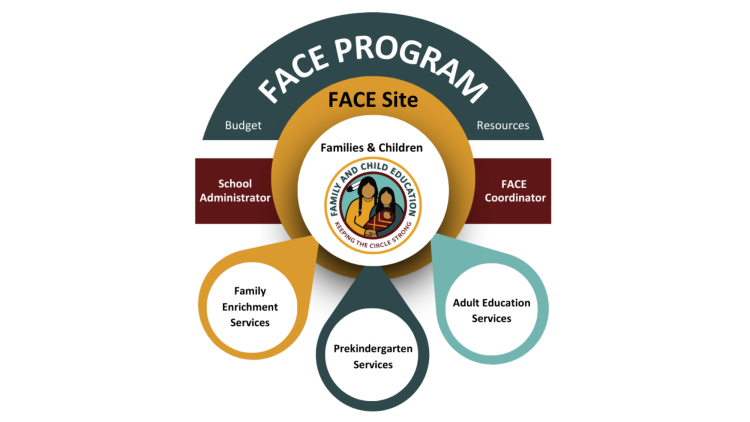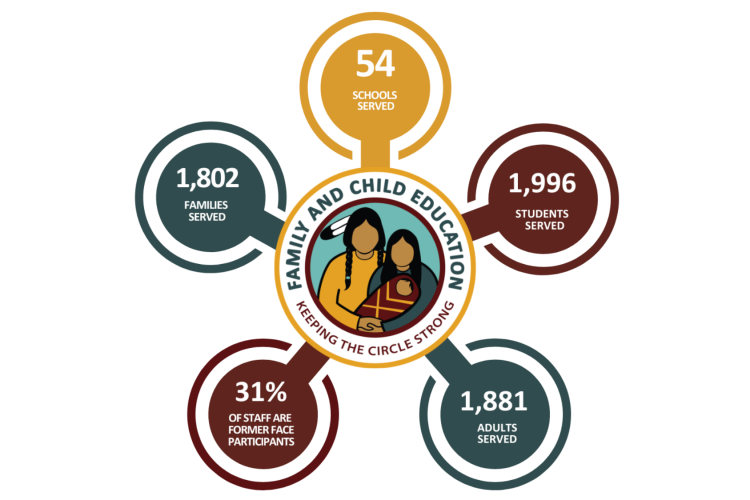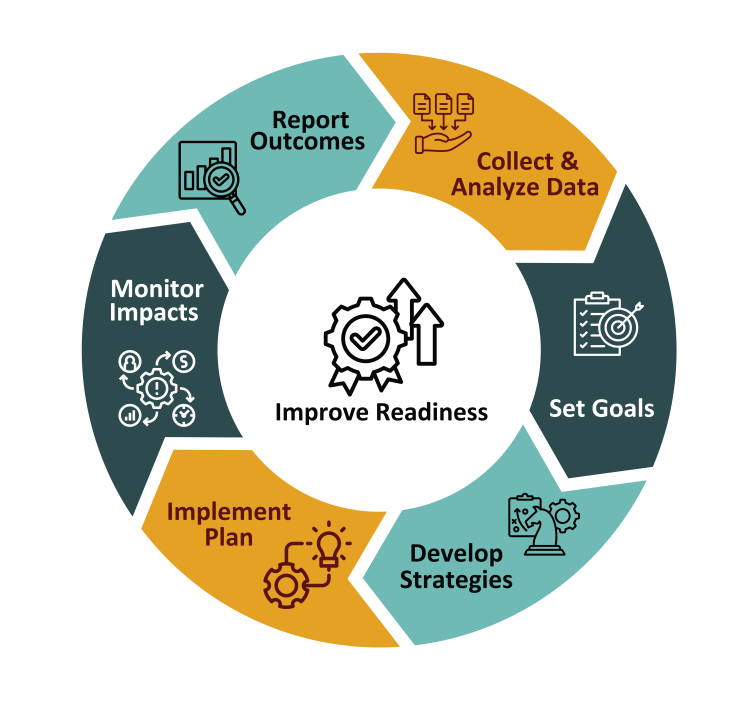Family and Child Education Program
Preparing Children for Prekindergarten and Kindergarten Readiness
The Family and Child Education Program, established in 1990, is a comprehensive early childhood education initiative serving 57 Bureau of Indian Education schools. The program is designed to empower children and families through learning experiences that ensure young learners are fully prepared for prekindergarten and kindergarten success.
Managed by the BIE’s Early Childhood Education Office, FACE integrates early childhood education with family engagement, fostering collaborative support for families in BIE-funded schools.

Comprehensive FACE Model
FACE is dedicated to strengthening family-school-community connections by offering a comprehensive early learning framework focused on prekindergarten and kindergarten readiness. The program provides three key services:
- Family Enrichment Services: Home-based learning support for children from prenatal to age 3, ensuring early developmental milestones are met for prekindergarten readiness.
- Prekindergarten Services: In-school instruction for children aged 4 to 5, designed to enhance kindergarten readiness skills.
- Adult Education Services: Programs focused on educational advancement and career readiness for adult learners equip families with tools to support their child's education. The teacher schedules prearranged hours with parents for active participation.
The FACE Program is committed to ensuring all participating children receive the foundational skills necessary to transition smoothly into prekindergarten and kindergarten classrooms.
Program Focus Areas for Readiness
To support school readiness and academic success, the FACE program emphasizes six core areas:

- Readiness Strategies: Developing cognitive, student resilience and motor skills.
- Data Collection and Utilization: Using assessments to improve learning outcomes.
- Curriculum and Assessment: Implementing research-based instructional practices.
- Transition Planning: Ensuring smooth transitions into prekindergarten and kindergarten classrooms.
- Engagement: Promoting active family participation in early learning.
- Local Language Integration: Honoring cultural heritage through language and tradition.
Program Initiatives
FACE ensures that children develop the necessary academic and resilience skills to succeed in kindergarten and beyond by:
- Encouraging early literacy and numeracy development
- Certified teachers provide structured learning opportunities that cultivate early math and reading skills, helping children become kindergarten-ready.
- Empowering families as their child’s first and most influential teacher
- FACE supports parents with adult education and parenting resources to foster an environment conducive to lifelong learning.
- Enhancing parent-child engagement in education
- The program integrates activities that strengthen early childhood learning experiences within the home environment.
- Building strong family-school-community partnerships
- FACE provides opportunities for families to connect with schools and community resources to support children's education beyond the classroom.
- Supporting local culture
- The program integrates culturally responsive teaching methods to reflect each community's unique identity.
Commitment to Readiness and Program Fidelity

FACE follows a structured improvement plan focused on achieving prekindergarten and kindergarten readiness, increasing family engagement, and improving adult education outcomes. The program ensures:
- Research-based instructional methods.
- Data-driven decision-making.
- Stakeholder collaboration to refine and improve program delivery.
- Continuous monitoring of child outcomes and school readiness benchmarks.
Strengths of FACE’s Kindergarten Readiness Model
FACE continuously enhances its model to improve school readiness outcomes by focusing on:
- Early Literacy and Numeracy: Ensuring children enter kindergarten with foundational skills in reading, writing and math.
- Structured Family Engagement: Helping parents actively support their child’s learning journey.
- Comprehensive Readiness Assessments: Using data to guide instruction and interventions.
- Responsive Learning: Integrating local language, culture and traditions into learning experiences.
- Ongoing Professional Development: Providing training for educators to implement best practices in early childhood education.
To ensure continuous improvement and successful implementation, FACE provides intensive site-level support through:
- On-site visits
- Routine coaching calls
- Technical assistance days
- Webinars
- Online training sessions
- Monthly check-ins
FACE Services for Kindergarten Readiness
FACE offers a variety of services designed to support early learning and family engagement, including:
- Personal visits
- FACE family events
- Developmental screenings
- Community resource networks
- Adult education opportunities
- Prekindergarten classrooms with certified instructors
- Dedicated parent time and coaching
- Parent and child together learning at home
- Parent and child participation in school schedule, rigor and routine
FACE It Together
Join the Readiness Movement
To find a site near you: FACE Directory
If interested in enrolling in FACE, fill out a Family Interest Form.
FACE Contact
BIE Early Childhood Education Programs, Family and Child Education (FACE) Office
Email: BIE_ECE_FACE@bie.edu


